Gujarat Board GSEB Solutions Class 6 Sanskrit Chapter 5 हस्ती हस्ती हस्ती Textbook Exercise Important Questions and Answers, Notes Pdf.
Gujarat Board Textbook Solutions Class 6 Sanskrit Chapter 5 हस्ती हस्ती हस्ती
GSEB Solutions Class 6 Sanskrit हस्ती हस्ती हस्ती Textbook Questions and Answers
1. Pronounce the following words orally:
નીચેના શબ્દોનું મોટેથી ઉચ્ચારણ કરો:
दैवी सृष्टिः, कदलीसदृशी शुण्डा, स्तम्भसमानाः, शूर्पाकारौ कर्णी, भाण्डाकारम्, उन्नतबृहच्छरीरम्, पुच्छम्, पर्वतसदृशे, अङ्कुशमात्रात्।
उत्तर:
(With the help of your Sanskrit teacher pronounce each word clearly and loudly thrice.)
(તમારા સંસ્કૃત શિક્ષકના માર્ગદર્શન હેઠળ આ શબ્દોનું ત્રણ વાર સ્પષ્ટ અને શુદ્ધ ઉચ્ચારણ કરો.)
![]()
2. Looking at the picture write the names of the parts of the elephant in the box :
હાથીનાં વિવિધ અંગોનાં નામ ચિત્રમાં જોઈ આપેલા કોષ્ટકમાં લખો:
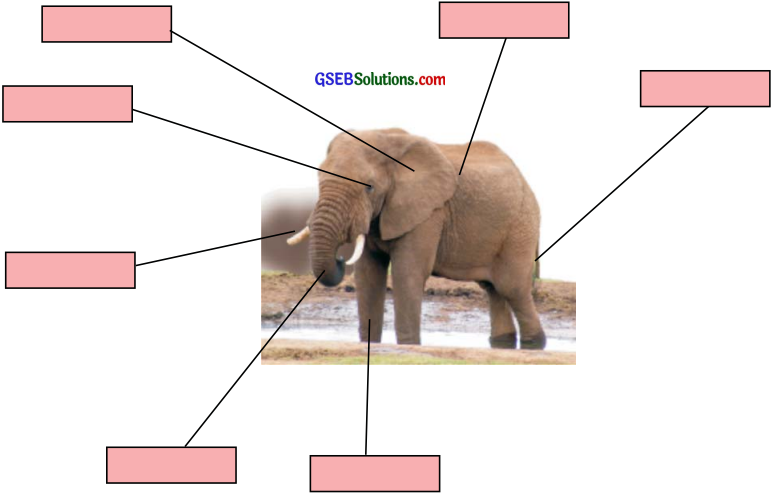
Answer:
Various body parts of an Elephant :
હાથીનાં વિવિધ અંગો:
- सर्षपसन्निभे नेत्रे – Mustard seed-like two eyes – સરસવ જેવી બે આંખો
- दी! धवलौ दन्तौ – two long, white tusks – લાંબા ધોળા બે દતુશળ
- कदलीसदृशी शुण्डा – banana-like trunk – કેળ જેવી સૂંઢ
- स्तम्भसमानाः पादाः – legs like pillars – થાંભલા જેવા પગ
- अल्पं तुच्छं पुच्छम् – small, insignificant tail – નાનકડું તુચ્છ પૂંછડું
- भाण्डाकारम् उदरम् – pot-shaped stomach – ઘડાના આકારનું પેટ
- शूर्पाकारौ कर्णी – winnowing trough-like two ears – સૂપડાના આકારના બે કાન
![]()
3. Write the lines of the poems in legible hand-writings :
નીચેની કાવ્યપંક્તિઓ સુવાચ્ય અક્ષરોમાં લખો :
हस्ती हस्ती हस्ती _________________________________
दिव्या दैवी सृष्टिः। _________________________________
कदलीसदृशी शुण्डा _________________________________
स्तम्भसमानाः पादाः। _________________________________
शूर्पाकारौ कर्णौ। _________________________________
धवलौ दी? दन्तौ। _________________________________
Answer:
(Write the given lines neatly in your notebook.)
(આ પંક્તિઓ તમારી નોંધપોથીમાં સ્વચ્છ અને શુદ્ધ અક્ષરોમાં લખો.)
4. Match ‘A’ with ‘B’ appropriately :
યોગ્ય જોડકાં જોડો :

उत्तर:
- पर्वतसदृशे
- दीर्धी
- कदलीसदृशी
- भाण्डाकारम्
- शूर्पाकारौ
![]()
5. Write the Sanskrit name of the pictures in the box given against each :
ચિત્રોની સામે આપેલા ખાનામાં તેનાં સંસ્કૃત નામ લખો:
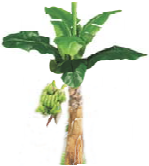 ____________________________________
____________________________________
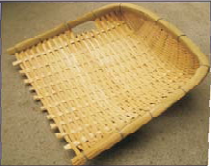 ____________________________________
____________________________________
 ____________________________________
____________________________________
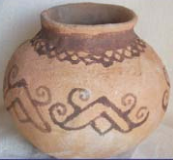 ____________________________________
____________________________________
Answer:
- कदली
- शूर्पः
- स्तम्भः
- भाण्डः, कुम्भः
Activity: प्रवृत्तिः
- Prepare a note of animals in groups.
જૂથમાં બેસી પ્રાણીપોથી બનાવો. - Draw a picture of an elephant.
હાથીનું ચિત્ર દોરો.
![]()
Sanskrit Digest Std 6 GSEB हस्ती हस्ती हस्ती Important Questions and Answers
1. Answer each of the following questions in one sentence in Sanskrit and English:
प्रश्न 1.
गजस्य शुण्डा कीदृशी अस्ति?
How is an elephant’s trunk?
હાથીની સૂંઢ કેવી છે?
उत्तर:
गजस्य शुण्डा कदलीसदृशी अस्ति।
The elephant’s trunk is like a banana.
હાથીની સૂંઢ કેળ જેવી છે.
प्रश्न 2.
गजस्य पादाः कीदृशाः सन्ति?
How are the elephant’s legs?
હાથીના પગ કેવા છે?
उत्तर:
गजस्य पादाः स्तम्भसमानाः सन्ति।
The elephant’s legs are like pillars.
હાથીના પગ થાંભલા જેવા છે.
प्रश्न 3.
गजस्य कौँ कीदृशौ?
How are the (two) ears of an elephant?
હાથીના કાન કેવા છે?
उत्तर:
गजस्य कर्णौ शूर्पाकारौ।
The (two) ears of an elephant are like winnowing troughs.
હાથીના કાન સૂપડાના આકારના છે.
![]()
प्रश्न 4.
गजस्य दन्तौ कीदृशौ?
How are the elephant’s tusks?
હાથીના બે દંકૂશળ કેવા છે?
उत्तर:
गजस्य दन्तौ धवलौ दी? च।
The elephant’s two tusks are white and long.
હાથીના બે દંકૂશળ ધોળા અને લાંબા છે.
प्रश्न 5.
गजस्य उदरं कीदृशम् अस्ति?
How is the elephant’s stomach?
હાથીનું પેટ કેવું છે?
उत्तर:
गजस्य उदरं भाण्डाकारम् अस्ति।
The elephant’s stomach is like a pot.
હાથીનું પેટ ઘડા જેવું છે.
प्रश्न 6.
गजस्य शरीरं कीदृशम् अस्ति?
How is the elephant’s body?
હાથીનું શરીર કેવું છે?
उत्तर:
गजस्य शरीरम् उन्नतं बृहत् च अस्ति।
The elephant’s body is high and huge.
હાથીનું શરીર ઊંચું અને મોટું છે.
![]()
प्रश्न 7.
गजस्य पुच्छं कीदृशम् अस्ति?
How is the elephant’s tail?
હાથીનું પૂંછડું કેવું છે?
उत्तर:
गजस्य पुच्छम् अल्पं तुच्छं च अस्ति।
The elephant’s tail is small and insignificant.
હાથીનું પૂંછડું નાનકડું અને તુચ્છ છે.
प्रश्न 8.
गजस्य पर्वतसदृशे गाने नेत्रे कीदृशे?
What type of eyes are there in the mountain-like body of the elephant?
હાથીના પર્વત જેવા શરીરમાં. બે આંખો કેવી છે?
उत्तर:
गजस्य पर्वतसदृशे गात्रे नेत्रे सर्षपसन्निभे।
There are two mustard seed-like eyes in the elephant’s mountain-like body.
હાથીના પર્વત જેવા શરીરમાં બે આંખો સરસવ જેવી છે.
प्रश्न 9.
अतिबलवान् हस्ती कस्मात् भीतः भवति?
Of What is the extremely strong elephant scared?
અત્યંત બળવાન હાથી શેનાથી ડરે છે?
उत्तर:
अतिबलवान् हस्ती अङ्कुशमात्रात् भीतः भवति।
The extremely strong elephant is scared with just a sharp-pointed stick.
અત્યંત બળવાન હાથી કેવળ અંકુશથી ડરે છે.
![]()
2. Find the correct option from the given options to answer each of the following questions :
Question 1.
How is an elephant’s trunk?
A. like pillars
B. like python
C. like large reptile
D. like banana tree
Answer:
D. like banana tree
Question 2.
How are the elephant’s legs?
A. like pillars
B. like trunk of a tree
C. like banana tree
D. high and huge
Answer:
A. like pillars
Question 3.
How are the ears of an elephant?
A. long
B. like winnowing trough-shaped
C. like fan
D. wide
Answer:
B. like winnowing trough-shaped
![]()
Question 4.
Which animal has white and long tusks?
A. Tiger
B. Giraffe
C. Camel
D. Elephant
Answer:
D. Elephant
Question 5.
How is the elephant’s tail?
A. long
B. fat
C. small and insignificant
D. wide and thin
Answer:
C. small and insignificant
Question 6.
हस्तिनः शुण्डा कीदृशी?
A. स्तम्भसमाना
B. शूर्पाकारः
C. कदलीसदृशी
D. पर्वतसदृशी
Answer:
C. कदलीसदृशी
![]()
Question 7.
हस्तिनः पादाः केन समानाः?
A. कदलीसमानाः
B. स्तम्भसमाना
C. भाण्डाकारम्
D. शूर्पाकारौ
Answer:
B. स्तम्भसमाना
Question 8.
हस्तिनः पुच्छं कीदृशम्?
A. शूर्पाकारम्
B. दीर्घम्
C. अल्पं तुच्छं च
D. विचित्रम्
Answer:
C. अल्पं तुच्छं च
Question 9.
हस्तिनः विशाले देहे तस्य नेत्रे कीदृशे?
A. प्रकाशितः
B. सर्षप-सन्निभ
C. दी?
D. कर्षको
Answer:
B. सर्षप-सन्निभ
![]()
Question 10.
महावतः अङ्कशमात्रात् कः भीतः?
A. गजः
B. कुक्कुरः
C. अश्वः
D. वृषभः
Answer:
A. गजः
Question 11.
The English meaning of a word ‘उदरम्’ is …………………………………………….
A. Elephant
B. Mouse
C. Stomach
D. Trunk
Answer:
C. Stomach
Question 12.
What is the meaning of a word ‘कदली’ is?
A. How many
B. Size
C. Small pot
D. Banana tree
Answer:
D. Banana tree
![]()
Question 13.
हस्तिनः दन्तौ ……………………………………………. स्तः।
A. कदलीसदृशौ
B. धवलौ दी? च
C. स्तम्भसमानौ
D. दीर्धी
Answer:
B. धवलौ दी? च
Question 14.
हस्तिनः शरीरम् ……………………………………………. च अस्ति।
A. पर्वतसदृशे
B. सर्षप-सन्निभ
C. उन्नतबृहत्
D. अतिबलवान्
Answer:
C. उन्नतबृहत्
Question 15.
हस्तिनः कर्णौ ……………………………………………. स्तः।
A. दी?
B. शूर्पाकारौ
C. पर्वतसदृशौ
D. स्तम्भसमानौ
Answer:
B. शूर्पाकारौ
![]()
Question 16.
कः दिव्या दैवी सृष्टिः अस्ति?
A. सिंह:
B. व्याघ्रः
C. शशक:
D. हस्ती
Answer:
D. हस्ती
3. Find out the true meaning of the following Sanskrit words from the alternatives given against them :
- शुण्डा – mustard seed / trunk
- हस्ती – Elephant/existance
- कदली – banana tree/lotus
- उदरम् – mouse/stomach
- धवलः – white/black
- भाण्डः – pot/time
- सन्निभः – like/winnowing trough shaped
- पुच्छम् – Then / Tail
Answer:
- trunk
- Elephant
- banana tree
- stomach
- white
- pot
- like
- Tail
![]()
4. write similar words of following Sanskrit words :
- हस्ती
- बृहत्
- पादः
- नेत्रे / नेत्रम्
- दन्तः
- शरीरः
- भाण्डः
- पर्वतः
- धवलः
उत्तर:
- गजः, करी
- महा
- चरणः
- लोचनम्
- रदनः
- कायः, वपुः
- कुम्भः, घटः
- शैलः, नगः
- श्वेतः
5. write Sanskrit word of the English words given below :
- body
- like banana
- mustard seed
- high
- pillar
- creation
- frightened
- huge
उत्तर:
- गात्रम्
- कदलीसदृशी
- सर्षप
- उन्नत
- स्तम्भः
- सृष्टिः
- भीतः
- बृहत्
![]()
6. Mark ‘आम्’ against of the correct sentences and ‘न्’ against the wrong sentences given below :
प्रश्न 1.
हस्तिनः कर्णो दी? स्तः।
उत्तर:
न
प्रश्न 2.
हस्तिनः दन्तौ शूर्पाकारौ स्तः।
उत्तर:
न
प्रश्न 3.
हस्तिनः शुण्डा कदलीसमाना अस्ति।
उत्तर:
आम्
प्रश्न 4.
हस्तिनः उदरम् उन्नतम् अस्ति।
उत्तर:
न
प्रश्न 5.
हस्तिनः पुच्छम् अल्पं तुच्छं च।
उत्तर:
आम्
प्रश्न 6.
हस्तिनः नेत्रे विशाले स्तः।
उत्तर:
न
![]()
प्रश्न 7.
हस्ती दिव्या दैवी सृष्टिः अस्ति।
उत्तर:
आम्
प्रश्न 8.
हस्ती अङ्कुशमात्रात् न भीतः।
उत्तर:
न
7. Join the following Section ‘A’ with Section ‘B’ :
| Section ‘A’ | Section ‘B’ |
| (१) दिव्या दैवी सृष्टिः | (१) पादाः |
| (२) स्तम्भसमानाः | (२) शरीरम् |
| (३) धवलौ दी? | (३) नेत्रे |
| (४) उन्नतबृहत् | (४) दन्तौ |
| (५) सर्षपसन्निभ | (५) हस्ती |
उत्तर:
| Section ‘A’ | Section ‘B’ |
| (१) दिव्या दैवी सृष्टि: | हस्ती |
| (२) स्तम्भसमानाः | पादाः |
| (३) धवलौ दी? | दन्तौ |
| (४) उन्नतबृहत् | शरीरम् |
| (५) सर्षपसन्निभ | नेत्रे |
8. Write answer of each of the following questions in one sentence in English :
Question 1.
How is the colour of an elephant?
હાથીનો રંગ કેવો છે?
Answer:
The colour of an elephant is black.
હાથીનો રંગ શ્યામ (કૃષ્ણ) છે.
![]()
Question 2.
With What has been compared the elephant’s trunk?
હાથીની સૂંઢની સરખામણી કોની સાથે કરવામાં આવી છે?
Answer:
Elephant’s trunk has been compared with banana tree.
હાથીની સૂંઢની સરખામણી કેળ સાથે કરવામાં આવી છે.
Question 3.
which part of a body does an elephant keep shaking as it moves?
હાથી ચાલતી વખતે શરીરનું કયું અંગ હલાવતો રહે છે?
Answer:
An elephant keeps shaking its tail as it moves.
હાથી ચાલતી વખતે તેનું પૂંછડું હલાવતો રહે છે.
Question 4.
How are the ears of an elephant?
હાથીના કાનની સરખામણી કોની સાથે કરી છે?
Answer:
The ears of an elephant are like winnowing troughs.
હાથીના કાનની સરખામણી સૂપડા સાથે કરી છે.
Question 5.
What is ‘अङ्कुश’ in ‘अङ्कुशमात्रात् भीतः हस्ती’?
‘अङ्कुशमात्रात् भीतः हस्ती’ “અંકુશ’ એટલે શું?
Answer:
The meaning of ‘अङ्कुश’ in ‘अङ्कुशमात्रात् भीतः हस्ती’ is an irontool for moving and controlling an elephant.
‘अङ्कुशमात्रात् भीतः हस्ती’ “અંકુશ’ એટલે હાથીને હાંકવાનું અને કાબૂમાં રાખવાનું લોઢાનું એક સાધન.
Question 6.
How are the elephant’s legs?
હાથીના પગ કેવા છે?
Answer:
The elephant’s legs are like pillars.
હાથીના પગ થાંભલા જેવા છે.
Question 7.
Which type of creation of God is the elephant?
હાથી કુદરતનું કેવું સર્જન છે?
Answer:
The elephant is a wonderful and divine creation of God.
હાથી કુદરતનું અદ્ભુત અને દિવ્ય સર્જન છે.
![]()
9. Transcribe the following sentences with a beautiful letters :
- हस्ती हस्ती हस्ती।
- दिव्या दैवी सृष्टिः।
- कदलीसदृशी शुण्डा
- स्तम्भसमानाः पादाः।
- शूर्पाकारौ की।
- धवलौ दी? दन्तौ।
(Note: The students will write in their notebook with beautiful letters.)
हस्ती हस्ती हस्ती Summary in Hindi
अन्वय (Prose-order);
Glossary and Translation

1. अन्वय : हस्ती, हस्ती, हस्ती! दिव्या दैवी सृष्टिः (अस्ति) !
Glossary :
हस्ती (गजः) – elephant.
सृष्टि: – creation.
दिव्या — unique.
दैवी – divine.
![]()
Translation :
Elephant, Elephant, Elephant ! (It) is a unique and divine creation !

2. अन्वय : (तस्य) शुण्डा कदलीसदृशी, पादाः स्तम्भसमानाः, कर्णौ शूर्पाकारौ, दन्तौ धवलौ दी? (च)।
Glossary :
(तस्य) शुण्डा – Its (the elephant’s) trunk.
कदलीसदृशी – like banana tree.
पादाः – legs (पादः means ‘one leg’).
स्त्म्भसमाना: – like pillars. Shunt – two ears (कर्ण means ‘one ear’).
शूर्पाकारौ – winnowing trough-shaped, like a trough.
दन्तौ – two teeth, two tusks (दन्तः means one tooth, tusk).
धवलौ – white.
दी? – lon
‘धवलौ’ and ‘दी?’ are adjectives of ‘दन्तौ’.
Translation : (The elephant’s) trunk is like a banana tree, (its) legs are like pillars, (its) ears are winnowing trough-shaped and (its) two tusks are white and long.
![]()
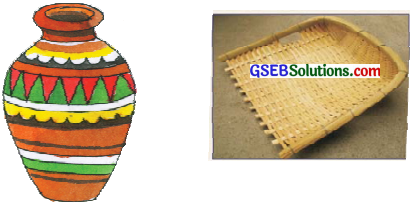
3. अन्वय : (तस्य) उदरम् भाण्डाकारम्, शरीरम् उन्नतबृहत् (अस्ति), (तस्य) पुच्छम् अल्पम् तुच्छम् (च)। अहो अहा विचित्रम्।
Glossary :
उदरम् – stomach.
भाण्डाकारम् – shaped (like a) pot.
उन्नतबृहत् – high and huge; are adjectives of ‘शरीरम्’.
पुच्छम् – tail.
अल्पम् तुच्छम् (च) – small and insignificant.
अहो अहा – wow, oh!
विचित्रम् – unique, beautiful.
Translation :
(Its) stomach is pot-shaped, body is high and huge. (Its) tail is small and insignificant. Oh wow ! How unique!

4. अन्वय : (तस्य) पर्वतसदृशे गात्रे सर्षपसन्निभनेत्रे। कथम् अतिबलवान् एषः अङ्कुशमात्रात् भीतः (अस्ति)!
![]()
Glossary :
पर्वतसदृशे गात्रे – in (its) mountain-like body.
सर्षपसन्निभनेत्रे – two eyes like mustard seeds (नेत्रे means two eyes, नेत्रम् means one eye’).
कथम् – how, why.
अतिबलवान् – extremely strong
एषः – this (elephant).
अङ्कशमात्रात् – only with a sharp-pointed stick.
अङ्कश (masc.)-a sharp-pointed stick used to control an elephant.
भीतः – is scared, is afraid.
Translation : (There are) two mustard seed-like eyes in its mountain-like huge body, how scared this extremely strong elephant is only with a sharp, pointed stick!
हस्ती हस्ती हस्ती Summary in Gujarati
અન્વય, શબ્દાર્થ અને ગુજરાતીમાં અનુવાદ
અન્વયે (ગદ્યક્રમમાં શબ્દોની ગોઠવણી), શબ્દાર્થ અને અનુવાદઃ
1. અન્વયઃ हस्ती, हस्ती, हस्ती! दिव्या दैवी सृष्टिः (अस्ति) !

અનુવાદઃ હાથી, હાથી, હાથી ! (એ) અદ્ભુત અને અલૌકિક સર્જન છે!
2. અન્વયઃ (तस्य) शुण्डा कदलीसदृशी, पादाः स्तम्भसमानाः, कर्णौ शूर्पाकारौ, दन्तौ धवलौ दी? (च)।

અનુવાદઃ (તે હાથીની) કેળ જેવી સૂંઢ, (તેના) થાંભલા જેવા પગો, (તેના) સૂપડાના આકારના કાન અને (તેના) ધોળા અને લાંબા બે દતૂશળ છે.
3. અન્વયઃ (तस्य) उदरम् भाण्डाकारम्, शरीरम् उन्नतबृहत् (अस्ति), (तस्य) पुच्छम् अल्पम् तुच्छम् (च)। अहो अहा विचित्रम्।

અનુવાદઃ (તેનું) ઘડાના આકારનું પેટ, (તથા) ઊંચું અને વિશાળ શરીર છે. (તેને) નાનકડું અને તુચ્છ પૂંછડું (છે). અરે વાહ, કેવું અદ્ભુત !
![]()
4. અન્વયઃ (तस्य) पर्वतसदृशे गात्रे सर्षपसन्निभनेत्रे। कथम् अतिबलवान् एषः अङ्कुशमात्रात् भीतः (अस्ति)!


અનુવાદઃ (તેના) પર્વત સમાન શરીરમાં સરસવ જેવી બે આંખો (છે), અત્યંત બળવાન આ હાથી કેવળ અંકુશથી કેવો ડરે છે!